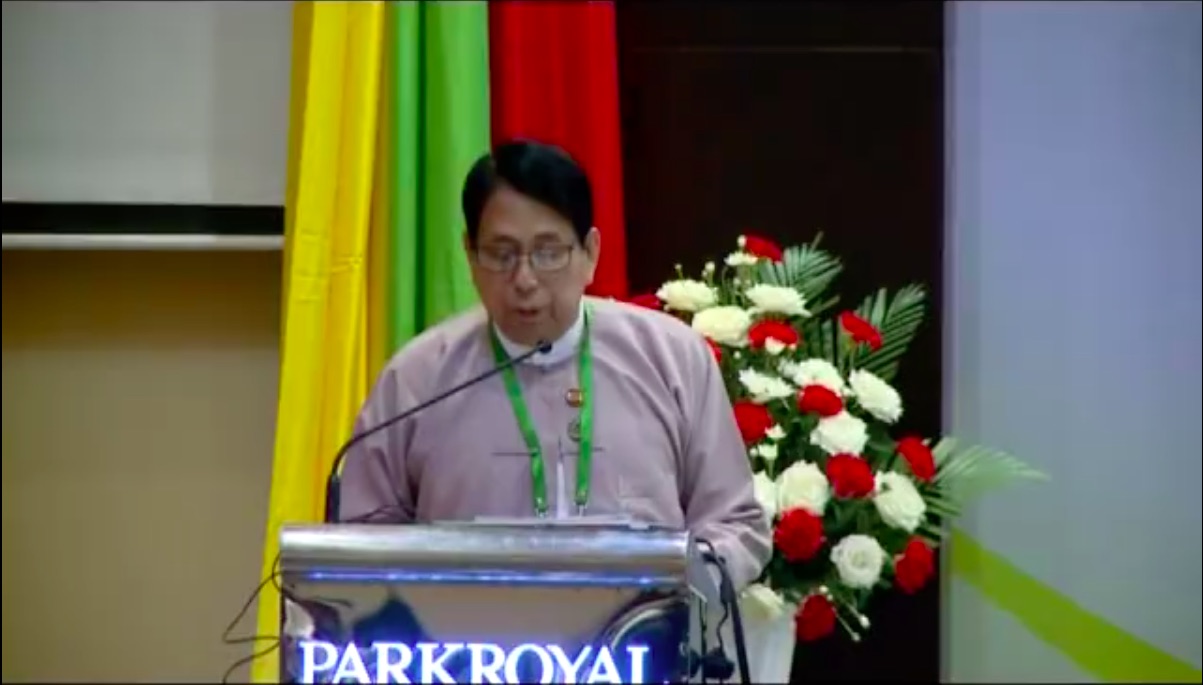Information Minister U Pe Myint has a message for Myanmar’s independent media: you’re not all that necessary.
Speaking at the 7th annual Media Development Forum in Naypyidaw yesterday, the minister not only starkly underlined the preeminence of state-run media, he preceded in turn to question any number of basic assumptions about the role of a free press.
“State-run media has the responsibility to act as the main bridge between the people and the government. I believe state-run media has a role to play in later governments, in whatever shape or form,” Pe Myint said.
As for criticisms regarding Myanmar’s media freedom, the minister, hand-selected by Aung San Suu Kyi’s National League for Democracy government, was ready for that, too.
For a full seven minutes, Pe Myint walked through a May examination of press freedom indexes by German public broadcaster Deutsche Welle, criticizing how groups Reporters Without Borders and Freedom House calculated their scores, and pointing out that funding from the US and France biased their perspectives.
He also more broadly questioned the notions of editorial independence and objectivity.
“[It] is important to think about [editorial independence] when talking about media development and press freedom,” the minister mused.
“How independent are journalists and editors who write their own stories? Can editors remain independent from newspapers producers? Can producers remain independent from their advertisers? Who controls editorial policy and independence? Is editorial policy in the hands of the editors? The journalists? Do they have freedom of press, freedom of expression if they don’t control editorial policy,” the minister asked.
Pe Myint wrapped up by repeating a recent comment from Myanmar Press Council Vice-President U Kyaw Naing, who told state-owned media that while journalists have a responsibility to provide the public with accurate information, they should “remember to love their country while doing their jobs.”
Alrighty then.
Unsurprisingly, media advocacy organizations and journalists quickly condemned the speech.
In a joint statement released within hours of the minister’s comments, 16 organizations sharply rejected his claims, pointing out that the minister had ignored the media’s role as a vital check on government institutions.
https://www.facebook.com/penmyanmar/posts/1927839223920100?__xts__[0]=68.ARAwY-L2wGkO1uKFaVIg9Rw-CDwFY_63wLV3I_Os_6JwWqn1IN6MjkeXoS0qMfDERXKDJnKje84hXe2JdtpbQIogLAdb-VQdtY5tylJUZTyEvgpqQqMW35GWKyzmU2IfQ_CrjrUOh8j49WlN_FXWrAxf3kA-yhhlcggeFPufwjTq2bMILcAGv_j9j11j_ngfNsbIpVm7RivMFOQD2yL3j00-xt94cE8nzwkgGVPNkT98aTYUFcvtTY6avnTghS9p9NTiPoTrU3IdiJjsLVFxgEP_3fc3PfbXKgLUz-o2_JHC83uRejuYIIRpxnkLxy9vTPkquq_se_1His2IBxmOCBTIFw&__tn__=-R
“The minister’s assertion about the state-run media’s role as a bridge between the government and the people is not in line with democratic norms and values. The ‘fourth pillar’ is a basic foundation that strengthens and maintains democratic standards. Our main responsibility is to maintain the three other pillars [the legislative, executive and judicial branches],” the statement said.
Government-owned media, they said, continually promotes state propaganda while failing to deliver legitimate criticism and ignoring widely reported atrocities committed by the army.
Quoted in a story today in his own paper, U Aung Zaw, editor-in-chief at the Irrawaddy, said Pe Myint’s comments reminded him of U Kyaw Hsan, the former information minister under the military regime.
“We had been faintly hoping that U Pe Myint would gradually dismantle the state-run media along with the Ministry of Information. Today is a sad day for independent media in Myanmar under the NLD government,” U Aung Zaw told The Irrawaddy.
The landmark press freedom case of two Reuters reporters, Wa Lone and Kyaw Soe Oo, who were sentenced to seven years’ hard labor under the Officials Secrets Act in September, is a high-profile example of deteriorating press freedom in Myanmar. The two were arrested by plainclothes officers while investigating the massacre of 10 Rohingya men in Northern Rakhine State.
The decline of press freedom in Myanmar isn’t isolated; media freedom has been on the decline amidst growing threats against news outlets across southeast Asia.
You can listen to the speech in its entirety here:





Reader Interactions